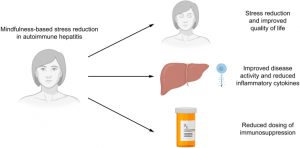Improve Autoimmune Hepatitis with Mindfulness
By John M. de Castro, Ph.D.
“Conventional medicine is great at taking test results and making recommendations based on those results, but it doesn’t really show you how to go about your day-to-day life with a chronic disease. Mindfulness is a practical coping tool and it’s always there when all else seems to fail.” – Shannon Harvey
The immune system is designed to protect the body from threats like stress, infection, injury, and toxic chemicals. One of its tools is the Inflammatory response. This response works quite well for short-term infections and injuries. But when inflammation is protracted and becomes chronic, it can itself become a threat to health. It can produce autoimmune diseases such as colitis, Chron’s disease, arthritis, heart disease, increased cancer risk, lung disease, sleep disruption, gum disease, decreased bone health, psoriasis, and depression.
When the immune system attacks the liver, it produces autoimmune hepatitis which damages the liver. It is rare but affects women four times more often than men. Mind-body techniques such as yoga, Tai Chi and meditation have been shown to adaptively reduce the inflammatory response. So, it would seem reasonable that mindfulness training may be effective in treating autoimmune hepatitis.
In today’s Research News article “Mindfulness-based stress reduction may decrease stress, disease activity, and inflammatory cytokine levels in patients with autoimmune hepatitis.” (See summary below or view the full text of the study at: https://www.ncbi.nlm.nih.gov/pmc/articles/PMC9011026/ ) Alrabadi and colleagues recruited adult patients with autoimmune hepatitis and treated them with 8 weekly 2 hour sessions of Mindfulness-Based Stress Reduction (MBSR). It involves meditation, yoga, body scan, group discussion, and homework. The patients were measured before and after training and 8 and 12 months later for perceived stress, emotion regulation, and self-control. In addition, blood was drawn and assayed for inflammatory cytokines.
They found that after Mindfulness-Based Stress Reduction (MBSR) there was a significant reduction in perceived stress and the doses of the steroid prednisone that persisted 12 months later. In addition, plasma cytokine levels were significantly improved after treatment. This is an uncontrolled pilot study whose findings suggest that mindfulness training may be an effective treatment for patients with autoimmune hepatitis, reducing inflammation and stress levels.
Mindfulness training appears to be and effective treatment for autoimmune diseases in general including autoimmune hepatitis.
CMCS – Center for Mindfulness and Contemplative Studies
This and other Contemplative Studies posts are also available on Twitter @MindfulResearch
Study Summary
Alrabadi, L. S., Dutton, A., Rabiee, A., Roberts, S. J., Deng, Y., Cusack, L., Silveira, M. G., Ciarleglio, M., Bucala, R., Sinha, R., Boyer, J. L., & Assis, D. N. (2022). Mindfulness-based stress reduction may decrease stress, disease activity, and inflammatory cytokine levels in patients with autoimmune hepatitis. JHEP reports : innovation in hepatology, 4(5), 100450. https://doi.org/10.1016/j.jhepr.2022.100450
Abstract
Background & Aims
Psychological and life stressors may impact autoimmune hepatitis (AIH) disease activity and increase relapse risk. Mindfulness-based stress reduction (MBSR) is a validated course that reduces stress reactivity, and improves stress and emotion regulation. This single-arm exploratory pilot study of adult patients with AIH aimed to define the impact of an 8-week MBSR program on quality of life, disease activity, and cytokine mediators.
Methods
The perceived stress survey-10 (PSS) and the brief self-control scale (BSCS) measured subjective distress and self-control. Serum alanine aminotransferase (ALT) and cytokine levels were measured, and immunosuppressant doses recorded.
Results
Seventeen patients completed the MBSR program. Post-MBSR, 71% (n = 12) showed PSS score improvement at 8 weeks vs. baseline (median 15 vs. 21, p = 0.02). At 12 months, PSS improvement persisted vs. baseline (median 15 vs. 21, p = 0.02). Post-MBSR, 71% (n = 12) showed BSCS score improvement at 8 weeks vs. baseline (median 4.1 vs. 3.8, p = 0.03). At 12 months, the median BSCS score remained significant (3.9 vs. 3.8, p = 0.03). After the 8-week MBSR, the 35% of patients with ALT >34 U/L had a median ALT reduction (44.5 vs. 71.5 U/L, p = 0.06), whereas the 71% of patients on prednisone had significant dose reductions (5.75 vs. 10 mg, p = 0.02) which persisted at 12 months vs. baseline (3.75 vs. 10 mg, p = 0.02) without a compensatory increase in steroid-sparing dosing. Significant improvement was noted in peripheral blood cytokine levels (IL-6, IL-8, IL-10, IL-17, IL-23, and sCD74/MIF ratio) from baseline to 8 weeks.
Conclusions
MBSR significantly improved perceived stress and self-control scores while decreasing ALT levels, steroid requirements, and inflammatory cytokine levels in this pilot study in adult AIH. Stress modification may impact quality of life and disease activity, and should be further evaluated as an intervention in AIH.
Lay summary
Autoimmune hepatitis can reduce quality of life and mental health, while stress may impact autoimmune hepatitis itself. We piloted mindfulness-based stress reduction as a strategy to reduce stress in adult patients with autoimmune hepatitis and found that the intervention reduced perceived stress and may have also impacted the disease by improving inflammation and medication needs. Stress reduction should be further studied to improve quality of life and possibly to impact disease activity in autoimmune hepatitis.
